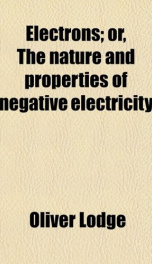electrons or the nature and properties of negative electricity

Purchase of this book includes free trial access to www.million-books.com where you can read more than a million books for free. This is an OCR edition with typos. Excerpt from book: CHAPTER III. FORESHADOWING OF THE ATOM OR INDIVISIBLE UNIT OF ELECTRICITY. So far we have dealt with the fundamental laws of electricity in' general. It is now time to begin to consider the possibly atomic or molecular condition in which it is associated with atoms of matter. Quoting again from the great Treatise of Clerk Maxwell, 1st Edition (1873), we find on page 312, in the chapter on electrolysis, the following sentence : " Suppose, however, that we leap over this difficulty by simply asserting the fact of the constant value of the molecular charge, and that we call this constant molecular charge, for convenience in description, one molecule of electricity." . . . Thus some idea of the conception of the atomic nature of electricity was long ago forced upon men of genius by the facts of electrolysis and a knowledge of Faraday's laws. But Maxwell went on, after a few more paragraphs : " It is extremely improbable that when we come to understand the true nature of electrolysis we shall retain in any form the theory of molecularcharges, for then we shall have obtained a secure basis on which to form a true theory of electric currents, and so become independent of these provisional theories." It is rash to predict what may ultimately happen, but the present state of electrical science seems hostile to this latter prediction of Maxwell. The theory of molecular charges looms bigger to-day, and has taken on a definiteness, largely as the outcome of his own work, that would have pleased and surprised him. The unit electric charge, the charge of a monad atom in electrolysis, whatever else it is, is a natural unit of electricity, of which we can have multiples, but of which, so far as we know at present, it is impossible to have fractions. I will extract the f...
Info about the book
Author:
Series:
Unknown
ISBN:
0911311696
Rating:
4.5/5 (3)Your rating:
0/5
Languge:
English
Users who have this book
Users who want this book
What readers are saying
What do you think? Write your own comment on this book!
write a commentif you like electrons or the nature and properties of negative electricity try:
Other books by this author
Do you want to read a book that interests you? It’s EASY!
Create an account and send a request for reading to other users on the Webpage of the book!



